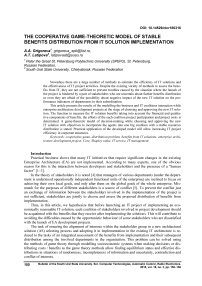The cooperative game-theoretic model of stable benefits distribution from IT solution implementation
Автор: Grigoreva A.A., Latipova A.T.
Рубрика: Краткие сообщения
Статья в выпуске: 3 т.18, 2018 года.
Бесплатный доступ
Nowadays there are a large number of methods to estimate the efficiency of IT solutions and the effectiveness of IT project activities. Despite the existing variety of methods to assess the benefits from IT, they are not sufficient to prevent troubles caused by the situation where the launch of the project is hindered by a part of stakeholders who are uncertain about further benefits distribution or even they are afraid of the possibility about negative impact of the new IT solution on the performance indicators of departments in their subordination. This article presents the results of the modelling the business and IT coalitions interaction while enterprise architecture development projects at the stage of choosing and approving the new IT solution. The function to measure the IT solution benefits taking into account the financial and qualitative components of benefits, the efforts of the each coalition project participation and project costs is determined. A game-theoretic model of decision-making while choosing and approving the new IT solution with objectives to incorporate the agents into one big coalition with a stable resources distribution is stated. Practical application of the developed model will allow increasing IT project efficiency in corporate structures.
Cooperative game, distribution problem, benefits from it solutions, enterprise architecture development project, core, shapley value, it service, it management, c-ядро
Короткий адрес: https://sciup.org/147232196
IDR: 147232196 | УДК: 330.4 | DOI: 10.14529/ctcr180316
Список литературы The cooperative game-theoretic model of stable benefits distribution from IT solution implementation
- Lankhorst, M.M. Enterprise Architecture Modelling - the Issue of Integration / M.M. Lankhorst // Advanced Engineering Informatics. - 2004. - Vol. 18, no. 4. - P. 205-216. DOI: 10.1016/j.aei.2005.01.005
- Nakakawa, A. Challenges of Involving Stakeholders when Creating Enterprise Architecture / A. Nakakawa, P. Bommel, H.A. Proper // 5th SIKS/BENAIS Conference on Enterprise Information Systems. - 2010. - P. 43-55.
- Smolander, K. Describing and Communicating Software Architecture in Practice: Observations on Stakeholders and Rationale / K. Smolander, T. Päivärinta // International Conference on Advanced Information Systems Engineering. - Springer Berlin Heidelberg, 2002. - P. 117-133. DOI: 10.1007/3-540-47961-9_11
- Freeman, R.E. A Stakeholder Approach to Strategic Management / R.E. Freeman, J. McVea // The Blackwell Handbook of Strategic Management. - 2001. - P. 183-201. DOI: 10.1111/b.9780631218616.2006.00007.x
- Jensen, M.C. Value Maximization, Stakeholder Theory and the Corporate Objective Function / M.C. Jensen // Journal of Applied Corporate Finance. - 2010. - Vol. 22, no. 1. - P. 32-42. DOI: 10.1111/j.1745-6622.2010.00259.x
- Von Neumann, J. Theory of Games and Economic Behavior (Commemorative Edition) / J. Von Neumann, O. Morgenstern. - Princeton University Press, 1990. - 666 p.
- Петросян, Л.А. Устойчивость решений дифференциальных игр со многими участниками / Л.А. Петросян // Вестник Ленинградского университета. Серия 1: математика, механика, астрономия. - 1977. - №. 19. - С. 46-52.


